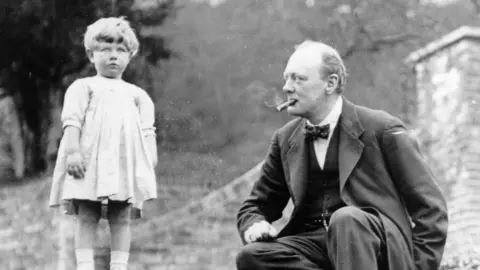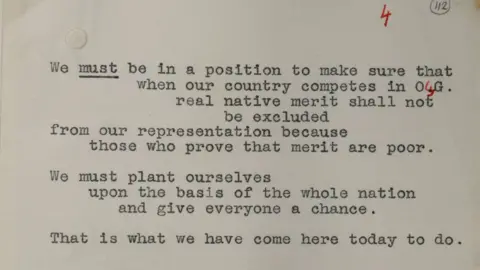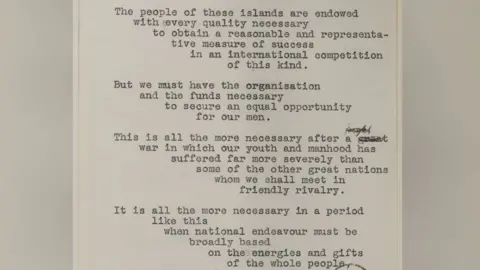Winston Churchill's Olympic speech rediscovered
 Churchill Archives Centre, Churchill Press Photographs, CHPH 1A/F2/8
Churchill Archives Centre, Churchill Press Photographs, CHPH 1A/F2/8A little-known speech made by Winston Churchill in the run up to the 1924 Paris Olympics has been uncovered in an archive.
The statesman was supporting a 1923 fundraising campaign to enable British athletes to take part in the Games based on merit, not just on whether they could afford it.
The letter was unearthed in the Churchill Archive Centre, part of the University of Cambridge, which holds the World War Two prime minister's papers.
Director Allen Packwood said while most people know Churchill as "the wartime leader and a bigger man", he was a keen sportsman in his youth.
"When people think of him now... they don't think of a sporting person, but he was the public school fencing champion in 1892 and when in the Army in India, his polo team won an inter-regimental cup in 1899," said Mr Packwood.
 Curtis Brown, London
Curtis Brown, LondonIn the speech, the future prime minister called for "the funds necessary to secure an equal opportunity for our men… We must be in a position to make sure that when our country competes in Olympic Games, real native merit shall not be excluded from our representation because those who prove that merit are poor".
The discovery was made after David Freeman, who edits Finest Hour, the journal of the International Churchill Society, asked Mr Packwood to see if there was anything that might link Churchill to the Olympics.
 Curtis Brown, London
Curtis Brown, LondonChurchill delivered the speech at Mansion House, in the City of London, in July 1923, supporting an appeal chaired by his close friend Lord Birkenhead, who was trying to raise £40,000 for the athletes.
He added poignantly that the Games would be taking place "after a war in which our youth and manhood has suffered far more severely than some of the other great nations whom we shall meet in friendly rivalry".
Mr Packwood said: "The interesting things about this speech is it is not included in the comprehensive publication of Winston Churchill's speeches by Robert Rhodes James, it's not included in the official biography of Winston Churchill and yet it's a fascinating speech setting out his views on the Olympics.
"What struck me about it was many of the concerns mentioned in it are equally relevant to today - the need for funding so that everyone can compete regardless of background, the need for professionalism in sport and the power of sport as a uniting force in difficult international times."
The 48-year-old politician was in a brief period out of parliament at the time, having lost his Dundee seat in 1922.
From 1924 until 1964, he was elected MP for Woodford, Essex.
Follow Cambridgeshire news on BBC Sounds, Facebook, Instagram and X.
